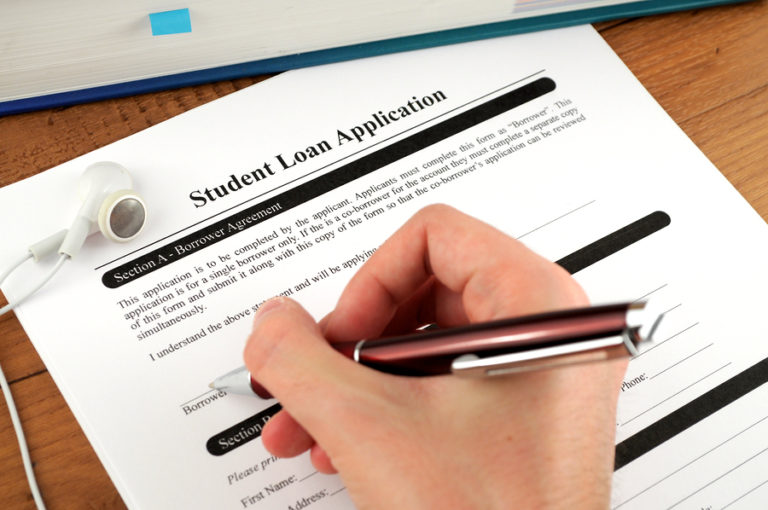When it comes to finding money for college, private student loans are often seen as the last resort. But if you're smart about how you apply for them, they can be a great way to finance your education.
What is the difference between private and public loans?
Private student loans are issued by banks, credit unions, and other lending institutions. They are not backed by the government and typically have higher interest rates than federal student loans. Private loans also have fewer repayment options and may require a cosigner.
To apply for a private student loan, you will need to fill out a credit application and provide information about your income, assets, and expenses. You may also be required to submit a copy of your transcripts or other proof of enrollment.
Once you are approved for a loan, you will need to sign a promissory note that outlines the terms of the loan. Be sure to read the promissory note carefully before you sign it. By signing the promissory note, you are agreeing to repay the loan according to the terms outlined in the note.
What are some things to consider before taking out a private student loan?
Before taking out a private student loan, you should first exhaust all other financial aid options, such as grants, scholarships, and federal student loans. Private loans should only be used to supplement other forms of financial aid.
You should also compare different lenders and loan terms before choosing a loan. Be sure to look at the interest rate, repayment options, and fees associated with each loan.
If you decide to take out a private student loan, make sure you are aware of all the terms and conditions of the loan. By understanding the loan terms, you can avoid defaulting on the loan and damaging your credit score.
How do you apply for a private student loan?
When you apply for a private student loan, the first thing your lender will look at is your credit score. If you have a good credit score, you're more likely to qualify for a lower interest rate. A student who wants to apply for a private loan must:
- Enrolled in a qualifying institution
- Credit and income requirements must be met
- If you don't have a creditworthy cosigner, be able to apply with one
- Prepare to use the loan for educational expenses.
- Verify the age, education, and citizenship requirements of all applicants
The first step while applying for a private student loan is to compare the terms of different lenders. This will help you in finding the best deal for you. The next step is to fill out and submit the online application form.
The final step is to wait for the decision of the lender. If you are approved, you will get the money within a few days. But if you are not approved, you may need to reapply with a cosigner.
Private student loans can be a great way to finance your education, but you need to be smart about how you apply for them. Follow these steps and you'll be on your way to getting the money you need for school.

Can you get a private student loan at any time?
There is no deadline for a private student loan application, which makes it easier than filling out the FAFSA for government financial assistance. You can apply at any time throughout the year, which is convenient if you have an expense that crops up midway through the term.
Keep in mind, however, that most lenders have a maximum amount you can borrow per year. So if you're planning on taking out a private loan to cover the entire cost of your education, you'll need to apply for it early enough to get the money you need.
Still, if you consider all the other options and decide that a private student loan is your best bet, it's good to know that you can apply for one at any time.
What month should you apply for private student loans?
Two months before the date when your school's tuition is due, submit your private student loan applications. Each institution has a distinct tuition deadline. To discover yours, check with the financial aid department at your school. The sooner you apply, the better.
Not only does this give you more time to shop around for the best interest rates, but it also means that you're less likely to run into any snags in the process. By applying early, you give yourself the best chance of getting the money you need on time.
How long does it take to get approved for a private student loan?
The length of time it takes to get approved for a private student loan depends on the lender you choose. Some lenders will give you a decision within minutes, while others may take a few days.
Once you've submitted your application, the lender will review your credit history and income to determine whether or not you're eligible for a loan. If you are approved, you'll receive the money within a few days. But if you're not approved, you may need to reapply with a cosigner.
There are cases when people are not able to get approved for a private student loan even if they have a cosigner. This usually happens when the borrower has a low income or bad credit history. When it comes to getting approved for a private student loan, there is no one-size-fits-all answer. It all depends on the lender you choose and your individual financial situation.
How easy is it to get a private loan?
Lenders that specialize in auto refinancing typically demand a credit score of at least 600, and the interest rate you'll be eligible for decreases as your credit score approaches 850. If you want to finance a new or used car, you'll need good credit — generally, a score of 660 or higher — to snag the best rates.
With private student loans, there's no one-size-fits-all answer to how easy it is to get approved. The most important factor is usually your credit score, but other factors like employment history and income can also come into play.
If you have a strong credit score and a steady income, you're likely to be approved for a private loan with fairly favorable terms. If your credit score is lower or you don't have much of a credit history, you may still be able to get a loan, but it may come with less favorable terms, such as a higher interest rate.
What is the maximum amount of private student loans you can borrow?
Private student loans are generally limited to the cost of attendance less other financial aid (including accepted federal student loans). The aggregate loan limits for undergraduate students are $75,000 to $120,000, while graduate and professional pupils can borrow up to $120,000. These maximums include both the principal and interest on the loan, as well as any fees that may be charged by the lender.
The amount of the private student loan depends on the student’s and/or the cosigner’s (if any) credit history and ability to repay the loan. For instance, some lenders may offer a $15,000 annual loan to a freshman with no credit history, while others may lend up to the full cost of attendance less than other financial aid for a student with an excellent credit history.
In case your credit history is not strong, you may have to secure a private student loan with the help of a creditworthy cosigner. If you cannot find a willing cosigner, some lenders offer private student loans without the need for a cosigner. These loans often have higher interest rates and fees than traditional loans, but they may be an option if you have no other way to finance your education.
What are Sallie Mae loans?
The Sallie Mae loan is a private student loan offered by the lending company Sallie Mae. The loan can be used for undergraduate, graduate, or professional expenses such as tuition, room and board, books, and other necessary costs.
Sallie Mae loans are available with both fixed and variable interest rates. Fixed interest rates will not change over the life of the loan, while variable interest rates may go up or down depending on market conditions. Sallie Mae loans also come with a number of repayment options, including immediate repayment, deferred repayment, and interest-only repayment.
Do Sallie Mae loans go directly to the school?
Sallie Mae will pay the money directly to the institution after it has been approved. Any additional funds, known as a student loan refund, will be delivered to you. To complete the process, you will need to sign and return the Master Promissory Note (MPN) to Sallie Mae. The MPN is a legal document that outlines the terms and conditions of your loan, including interest rates, repayment options, and grace periods.

You will also need to complete Entrance Counseling, which is required by law for all federal student loans. Entrance Counseling provides information on your rights and responsibilities as a borrower and helps you understand the consequences of default.
Sallie Mae's Smart Option Student Loan offers a number of benefits, including no origination fee, multiple in-school repayment options, and a choice of fixed or variable interest rates. You can also choose to have the money disbursed directly to you or to your school.
To apply for a Sallie Mae loan, you'll need to fill out an online application and provide information on your income, expenses, and financial aid. You'll also need to have a co-signer if you're under the age of 21 or don't have a credit history.
What should you do after the private student loan application?
After you have applied for a private student loan, you will likely receive a credit decision within a few days. If you are approved for the loan, you will then need to sign and return the loan agreement. Once the agreement is received and processed, the money will be disbursed to your school (if applicable) or directly to you.
If you have any questions about the process, be sure to contact your lender. They should be able to help guide you through each step of the process so that you can get the money you need to pay for school. After the application process is complete and the money is disbursed, you will then be responsible for making your loan payments on time each month. Be sure to stay on top of your payments so that you can avoid defaulting on your loan.
If you have any questions about the process, be sure to contact your lender. They should be able to help guide you through each step of the process so that you can get the money you need to pay for school. After the application process is complete and the money is disbursed, you will then be responsible for making your loan payments on time each month. Be sure to stay on top of your payments so that you can avoid defaulting on your loan.
Are private loans worth it?
Fixed rates for private loans are frequently five to 20 years long. Variable rates are typically lower than fixed and make sense if you can pay off the loan before interest rates increase too much, according to financial aid expert Mark Kantrowitz.
The average graduate finishes school with $28,400 in student loans, according to Kantrowitz. If you have a degree that will lead to high earnings, it may be worth taking on debt to get your education.
But if you're not sure what you want to do after graduation or are planning on going into a low-paying field, private loans may not be the best option. You may want to consider federal loans first, which offer income-based repayment plans and loan forgiveness programs.